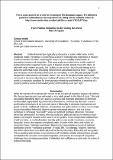From political friendship to befriending the world
Abstract
Political friendship is typically portrayed as a dyadic relationship. In this traditional model, friendship is conceived as a positive intersubjective experience of relation-to-self and relation-to-other, assuming the reciprocity and equality characteristic of symmetrical relations of recognition. This essay explores an alternative, triadic model of political friendship suggested by the work of Hannah Arendt. Arendt makes the claim, at odds with most modern accounts, that “politics is not so much about human beings as it is about the world that comes into being between them and endures beyond them.” I suggest that the dyadic model of political friendship is incomplete; a more adequate paradigm would foreground triadic relations of interest, concern and care for the phenomenal world itself, conceived as the quasi-objective intermediary of human artifice. As a “public thing,” a shared world is a necessary condition for intersubjective friendship and therefore is deserving of a properly political mode of acknowledgement and friendship in its own right.
Citation
Hayden , P 2015 , ' From political friendship to befriending the world ' , The European Legacy , vol. 20 , no. 7 , pp. 745-764 . https://doi.org/10.1080/10848770.2015.1069082
Publication
The European Legacy
Status
Peer reviewed
ISSN
1084-8770Type
Journal article
Collections
Items in the St Andrews Research Repository are protected by copyright, with all rights reserved, unless otherwise indicated.

